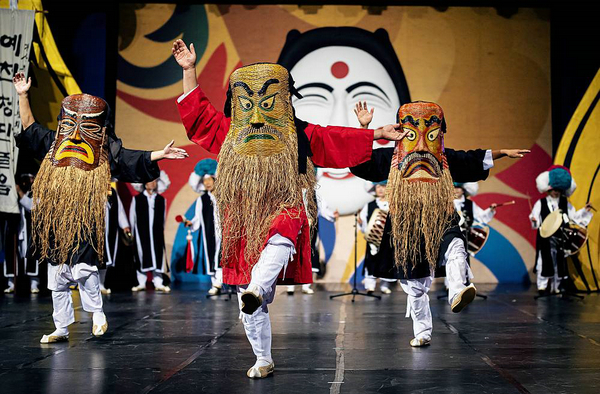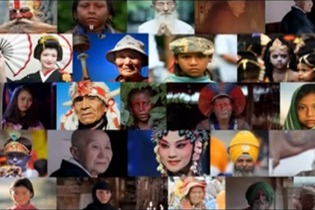Discover the newly inscribed elements on the 2003 Convention Lists!

During this year’s session in Rabat, Kingdom of Morocco, the Intergovernmental Committee for the Safeguarding of the Intangible Cultural Heritage inscribed 4 elements on the List of Intangible Cultural Heritage in Need of Urgent Safeguarding, and 39 elements on the Representative List of the Intangible Cultural Heritage of Humanity.
Members of the Committee, chaired by H.E. Mr Samir Addahre, Ambassador and Permanent Delegate of the Kingdom of Morocco to UNESCO, allotted a total of USD$305,144 as part of the International Assistance mechanism to one project to further safeguard living heritage in Malawi titled ‘Safeguarding of ludodiversity in Malawi through formal and non-formal education’.
The Committee also selected 4 programmes for the Register of Good Safeguarding Practices, including ‘Al Sadu Educational Programme: Train the trainers in the art of weaving’ in Kuwait and the ‘Portuguese-Galician border ICH: a safeguarding model created by Ponte…nas ondas!’ in Portugal and Spain.
UNESCO’s Intangible Cultural Heritage Lists now feature 678 elements corresponding to 140 countries.
Additions to List of the Intangible Cultural Heritage in Need of Urgent Safeguarding
Viet Nam: Art of pottery-making of Chăm people
Chile: Quinchamalí and Santa Cruz de Cuca pottery
Türkiye: Traditional Ahlat stonework
Albania: Xhubleta, skills, craftsmanship and forms of usage
Additions to the Representative List of the Intangible Cultural Heritage of Humanity
United Arab Emirates: Al Talli, traditional embroidery skills in the United Arab Emirates
Oman: Al-Khanjar, craft skills and social practices
Jordan: Al-Mansaf in Jordan, a festive banquet and its social and cultural meanings
Saudi Arabia, Oman and United Arab Emirates: Alheda’a, oral traditions of calling camel flocks
Colombia: Ancestral system of knowledge of the four indigenous peoples, Arhuaco, Kankuamo, Kogui and Wiwa of the Sierra Nevada de Santa Marta
France: Artisanal know-how and culture of baguette bread
Greece: August 15th (Dekapentavgoustos) festivities in two Highland Communities of Northern Greece: Tranos Choros (Grand Dance) in Vlasti and Syrrako Festival
Andorra and France: Bear festivities in the Pyrenees
Slovenia: Beekeeping in Slovenia, a way of life
Iran (Islamic Republic of) and Syrian Arab Republic: Crafting and playing the Oud|element:01867]]
Azerbaijan and Türkiye: Culture of Çay (tea), a symbol of identity, hospitality and social interaction
United Arab Emirates, Bahrain, Egypt, Iraq, Jordan, Kuwait, Mauritania, Morocco, Oman, Palestine, Qatar, Saudi Arabia, Sudan, Tunisia and Yemen: Date palm, knowledge, skills, traditions and practices (the inscription of this element have been extended to countries in bold)
Egypt: Festivals related to the Journey of the Holy family in Egypt
Croatia: Festivity of Saint Tryphon and the Kolo (chain dance) of Saint Tryphon, traditions of Croats from Boka Kotorska (Bay of Kotor) who live in the Republic of Croatia
Japan: Furyu-odori, ritual dances imbued with people’s hopes and prayers
Tunisia: Harissa, knowledge, skills and culinary and social practices
Guatemala: Holy Week in Guatemala
Hungary: Hungarian string band tradition
Zambia: Kalela dance
Saudi Arabia: Knowledge and practices related to cultivating Khawlani coffee beans
Cuba: Knowledge of the light rum masters
Cambodia: Kun Lbokator, traditional martial arts in Cambodia
Austria, Bosnia and Herzegovina, Croatia, Hungary, Italy, Romania, Slovakia and Slovenia: Lipizzan horse breeding traditions
Spain: Manual bell ringing
Kazakhstan: Orteke, traditional performing art in Kazakhstan: dance, puppet and music
Azerbaijan: Pehlevanliq culture: traditional zorkhana games, sports and wrestling
Democratic People’s Republic of Korea: Pyongyang Raengmyon custom
Algeria: Raï, popular folk song of Algeria
Afghanistan, Azerbaijan, Iran (Islamic Republic of), Türkiye, Tajikistan, Turkmenistan and Uzbekistan: Sericulture and traditional production of silk for weaving
Serbia: Social practices and knowledge related to the preparation and use of the traditional plum spirit – šljivovica
Belarus: Straw weaving in Belarus, art, craft and skills
Republic of Korea: Talchum, mask dance drama in the Republic of Korea (pictured above)
Azerbaijan, Kazakhstan, Kyrgyzstan, Tajikistan, Türkiye, Turkmenistan and Uzbekistan: Telling tradition of Nasreddin Hodja/ Molla Nesreddin/ Molla Ependi/ Apendi/ Afendi Kozhanasyr Anecdotes
Romania and Republic of Moldova: The art of the traditional blouse with embroidery on the shoulder (altiţă) — an element of cultural identity in Romania and the Republic of Moldova
Germany: The practice of Modern Dance in Germany
Austria, Czechia, Germany, Latvia, Poland and Spain: Timber rafting
China: Traditional tea processing techniques and associated social practices in China
Turkmenistan and Iran (Islamic Republic of): Turkmen-style needlework art
Iran (Islamic Republic of) and Afghanistan:Yaldā/Chella
Additions to the Register of Good Safeguarding Practices
Kuwait: Al Sadu Educational Programme: Train the trainers in the art of weaving
Portugal and Spain: Portuguese-Galician border ICH: a safeguarding model created by Ponte…nas ondas!
Czechia: Strategy for safeguarding traditional crafts: The Bearers of Folk Craft Tradition programme
Italy, Belgium, Croatia, Cyprus and France: Tocatì, a shared programme for the safeguarding of traditional games and sports

Address: 81, Laiguangying West Road, Chaoyang District, Beijing, China
Zip Code: 100021
Tel: 86-10-64966526
Fax: 86-10-64969281
E-mail: crihap@crihap.cn
Leave us your e-mail address, we'll let you know about current events.



